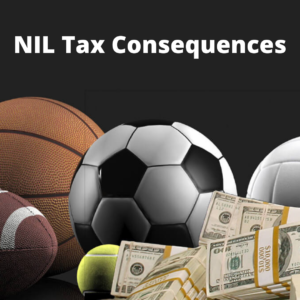College Athlete Profiting from Your Name, Image, and Likeness? Beware of the Tax Consequences
In the wake of the Supreme Court’s decision in Alston (which prohibited the NCAA from placing limits on the education-related benefits schools offer student athletes), the NCAA lifted its ban on student athletes’ ability to profit off their name, image, and likeness (NIL), so long as such activity is allowed by state law.

In late June 2021, the state of Illinois became the 20th state to allow college athletes to profit off their NIL by passing the “Student-Athlete Endorsement Rights Act.”
Such laws allow college athletes in Illinois and other states with similar legislation to engage in income-generating activities based on their celebrity, such as product endorsement deals, autograph signings, and social media promotions.
The biggest collegiate stars could earn millions of dollars annually using their NIL, and as such, should plan for and be mindful of the potential tax ramifications.
For example, let’s say Kofi Cockburn, the returning All-American candidate for the University of Illinois men’s basketball team, signs a $1 million endorsement deal with Nike. Before spending all that money at Kam’s or Red Lion, “King Kofi” (a great nickname for marketing by the way) could owe close to $400,000 (40% of that amount) in taxes to the federal and state taxing authorities! Previously, Kofi’s scholarship and other education benefits would have been nontaxable to him, and without income to report, he may not even have had to file a tax return.
Now, with more than $1 million in non-employee 1099 income, not only will Kofi need to file federal and state tax returns, but the IRS will deem the NIL payments as self-employment income, requiring him to make quarterly estimated tax payments and pay self-employment tax. Failure to comply could result in substantial penalties, interest, and possibly even criminal prosecution if the government can prove a willful failure to pay taxes.
The IRS and DOJ will no doubt closely monitor the developing NIL situation and look for opportunities to pursue tax audits and criminal tax prosecutions where student athletes fail to comply with and/or flout their tax reporting and payment obligations.
The DOJ Tax Division often pursues high-profile criminal tax prosecutions against athletes and other celebrities to garner media attention and deter noncompliance by others similarly situated (see the criminal tax prosecutions of Pete Rose, Darryl Strawberry, and Lawrence Taylor, just to name a few).
What should student athletes do to avoid problems with the IRS and state/local taxing authorities?
- Consult with a tax attorney or CPA prior before entering into any NIL deals
- Consider forming a business entity (i.e., LLC) to conduct the NIL activities
- The entity provides liability protection and potential tax advantages.
- Open a separate bank account for depositing income and paying expenses related to NIL activities. This allows for easier bookkeeping and tax reporting. Don’t commingle personal expenses with business expenses.
- Make estimated quarterly tax payments based on income received as part of NIL deals
- File annual tax returns with the IRS and appropriate state and local taxing authorities (depending on where they live or perform services, athletes may be subject to municipal/city earnings tax obligations in addition to federal and state income taxes).
Listen below to a clip from “The Mark Milton Show” about NIL and the rapidly evolving college sports landscape.
Mark Milton earned his bachelor’s degree in Accountancy from the University of Illinois at Urbana-Champaign and law degree from St. Louis University School of Law. Prior to starting his own law firm, Milton served as a Trial Attorney with the U.S. Department of Justice, Tax Division, in Washington, D.C.


